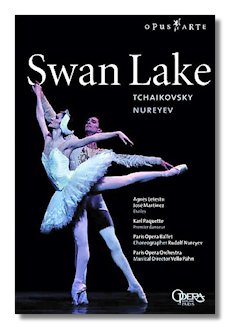
The Internet's Premier Classical Music Source
Related Links
- Tchaikovsky Reviews
- Latest Reviews
- More Reviews
-
By Composer
-
Collections
DVD & Blu-ray
Books
Concert Reviews
Articles/Interviews
Software
Audio
Search Amazon
Recommended Links
Site News
 DVD Review
DVD Review
Piotr Ilyitch Tchaikovsky

Swan Lake
- Agnès Letestu (Odette/Odile)
- José Martinez (Prince Siegfried)
- Karl Paquette (Wolfgang/Rothbart)
- Muriel Hallé (Queen)
Paris Opera Ballet
Paris Opera Orchestra/Vello Pähn
Opus Arte OA0966D DVD 145min DTS LPCM Stereo Anamorphic Widescreen
Also released on HD-DVD 5001
Amazon
- UK
- Germany
- Canada
- France
- Japan
- CD Universe
This production, recorded in 2005, uses Rudolf Nureyev's choreography. Nureyev danced the role of Prince Siegfried many times, of course, and in 1984 he created his own version of the ballet for Paris. He did not, however, depart from Petipa's original to any great degree. Nureyev gave the role of Wolfgang, Siegfried's usually comical tutor, to the same dancer who performed Rothbart, thereby making the character more sinister and psychologically deep. Nureyev also starts the evening with Siegfried's dream, in which the Prince sees Odette carried away into the sky by Rothbart – an image repeated at the very end of the ballet. Rothbart also participates in the Act 3 pas de deux for Siegfried and Odile, the false Odette. Nureyev goes beyond Petipa by complicating the geometrical patterns formed by the swans in the second and fourth acts, but this is hardly revolutionary. Paradoxically, Nureyev makes Siegfried a more central figure in the ballet, and weakens him at the same time. While we learn more about the Prince in this version, what we learn is that he is fragile. There's also the suggestion that his sexuality is unstable. Odette seems stronger than he, and of course he is no match for Odile and Wolfgang/Rothbart.
Étoile José Martinez is an apt choice for the role of Siegfried in Nureyev's Swan Lake. Here, he is a sensitive and highly polished dancer, but never flashy nor outwardly athletic. He is an excellent partner for Agnès Letestu's Odette/Odile, but when he is without her he is restrained, even diffident. Letestu has all of Martinez's technical skills, but she is a far more emotional performer. Her differentiation of Odette and Odile, while subtle, is complete, down to her facial expressions – noble and tortured for the white swan, and arrogantly assured for the black. Karl Paquette dances ebulliently in his double role. The ensemble work in this production is very strong, particularly among the swans, who are eerily cool and precise. Sometimes the pas de quatre for the little swans is cute or amusing; here it is chilly, but I think that is what this production calls for. Even though this is a youthful and streamlined Swan Lake, there's little joie de vivre in it. It's great to watch, though.
Even better than the dancing is the music, as conducted by Vello Pähn. This is a major dusting off of Tchaikovsky's score, which has seldom sounded so fresh, and so inviting of dance. In fact, if someone were to release the soundtrack of this DVD on CD, it would be my first choice for recordings of Swan Lake. It comes across spectacularly here, thanks to Opus Arte's engineering. The widescreen visuals are excellent too, even when the stage lighting is murky. A wide range of camera angles gives the viewer both the "big picture" and the important details.
There are several versions of Swan Lake on DVD now. Each one has something to offer. I'd get this one for the music, and for Nureyev's choreography, which is classical but never stuffy.
Copyright © 2007, Raymond Tuttle




















